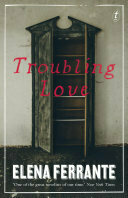
Following her mother’s untimely and mysterious death, Delia embarks on a voyage of discovery through the streets of her native Naples searching for the truth about her family. Reality is buried somewhere in the fertile soil of memory, and Delia is determined to find it. This stylish fiction is set in a beguiling but often hostile Naples, whose chaotic, suffocating streets become one of the book’s central motifs. A story about mothers and daughters, and the complicated knot of lies and emotions that binds them. Elena Ferrante was born in Naples. She is the author of seven novels: The Days of Abandonment, Troubling Love, The Lost Daughter, and the quartet of Neapolitan Novels: My Brilliant Friend, The Story of a New Name, Those Who Leave and Those Who Stay, and The Story of the Lost Child. Fragments, a selection of interviews, letters and occasional writings by Ferrante, will be published in early 2016. She is one of Italy’s most acclaimed authors. Ann Goldstein has translated all of Elena Ferrante’s work. She is an editor at the New Yorker and a recipient of the PEN Renato Poggioli Translation Award. ‘Ferrante’s polished language belies the rawness of her imagery, which conveys perversity, violence, and bodily functions in ripe detail.’ New Yorker ‘It’s the first time a novel ever made me get physical, and it was the first good mood I’d been in for weeks.’ New York Times ‘Like Joyce’s Ulysses, this journey draws vigorously on its cityscape. Naples is one of those sun-drenched spooky cities, thrumming with life and populated by ghosts, spastic with impermeable local culture.’ Time Out New York ‘A brutally frank tale about the dangerous intersection of rage and desire.’ Booklist ‘Both The Days of Abandonment and Troubling Love are tour de forces, and harrowing tours of a feminine psyche under siege. They both confirm Ferrante’s reputation as one of Italy’s best contemporary novelists.’ Seattle Times ‘There is an increasingly hallucinatory quality to the prose, a vulgarity and grotesqueness, too. Ferrante’s novels are regarded as brilliant. Gritty and confronting, they are about an underbelly of southern Italy tourists rarely see.’ New Zealand Herald ‘Ferrante’s uncompromising directness and her unflinching gaze cannot be faulted.’ Age/Sydney Morning Herald ‘The most erratic of the three novellas, its unhinged, broken quality matching the psyche of both Delia and her mother, whose violent history is hinted at in the character of a half-drawn child...It’s brave to write a protagonist who at turns shames and exalts her mother with such cruelty and tenderness.’ New Zealand Listener